2017年高考一轮教材复习课件人教课标高一必修1 Unit 1 Friendship(67张)
文档属性
| 名称 | 2017年高考一轮教材复习课件人教课标高一必修1 Unit 1 Friendship(67张) |
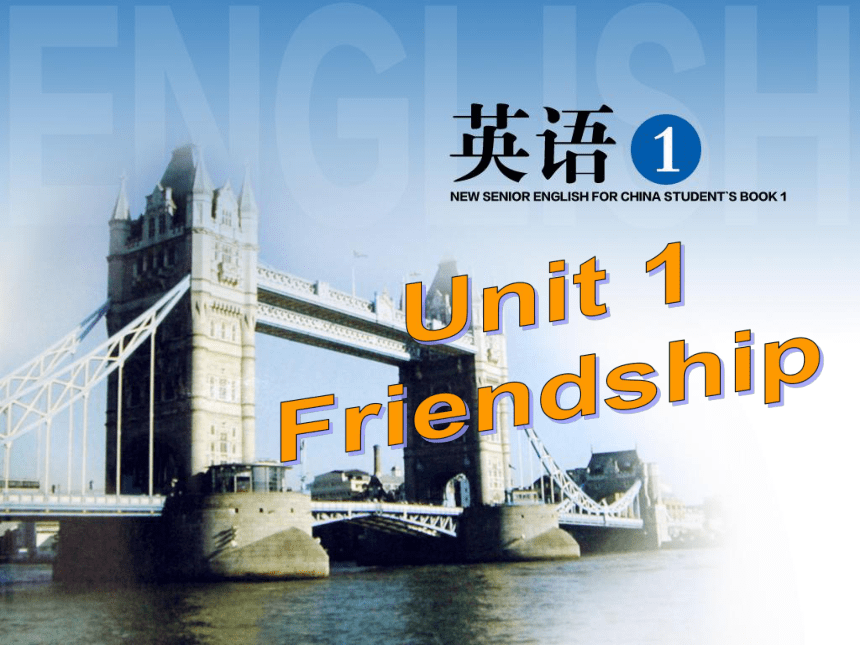
|
|
| 格式 | zip | ||
| 文件大小 | 987.4KB | ||
| 资源类型 | 教案 | ||
| 版本资源 | 人教版(新课程标准) | ||
| 科目 | 英语 | ||
| 更新时间 | 2017-01-15 00:00:00 | ||
图片预览


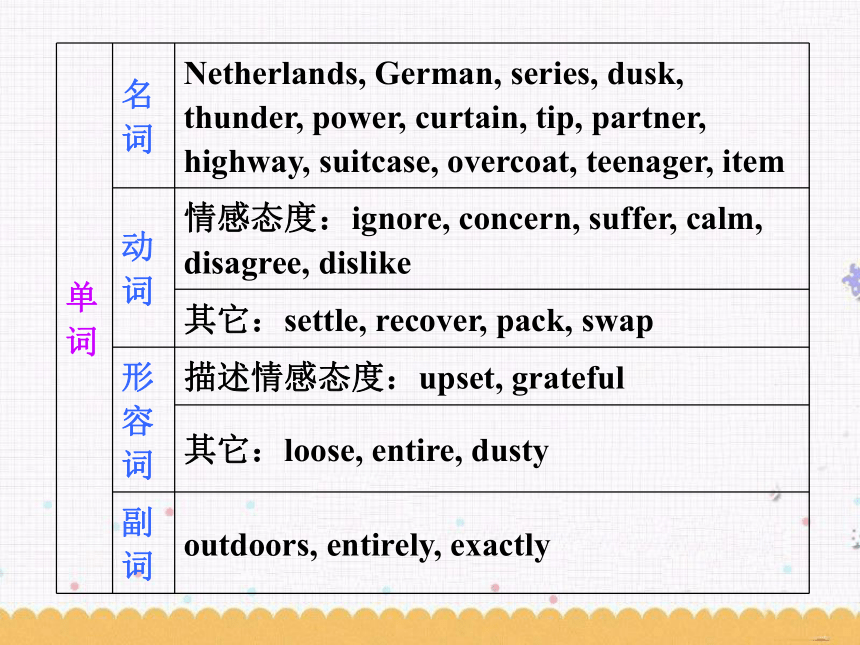
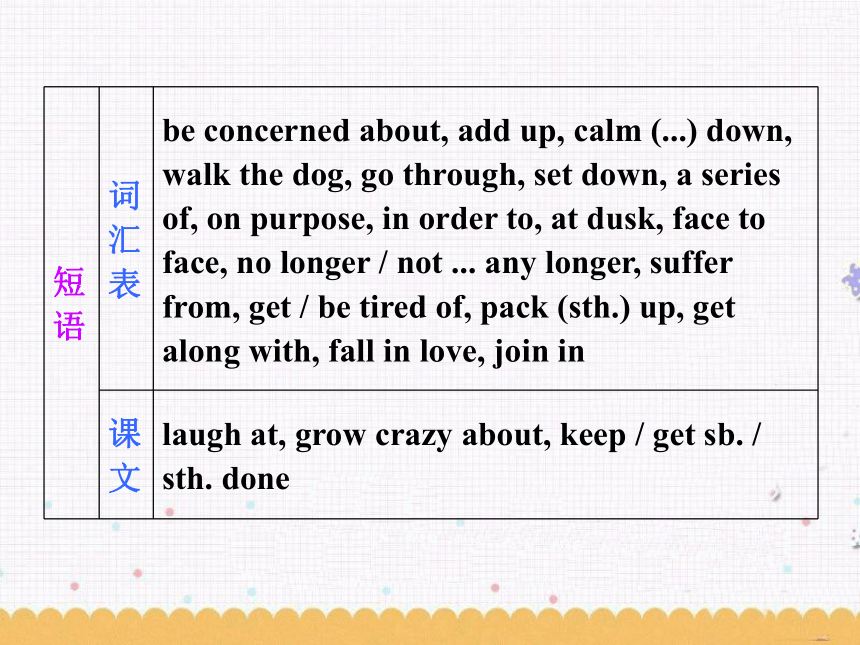
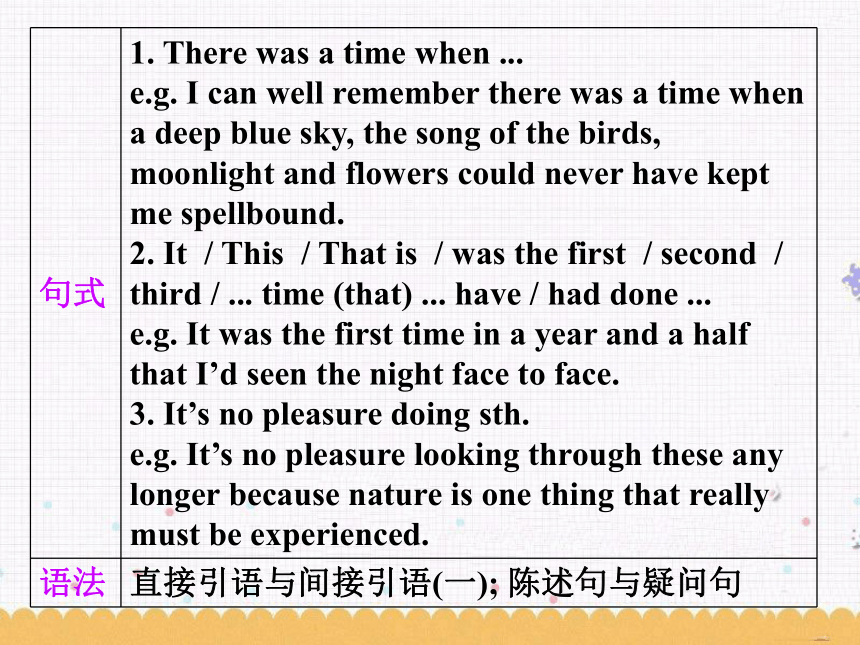
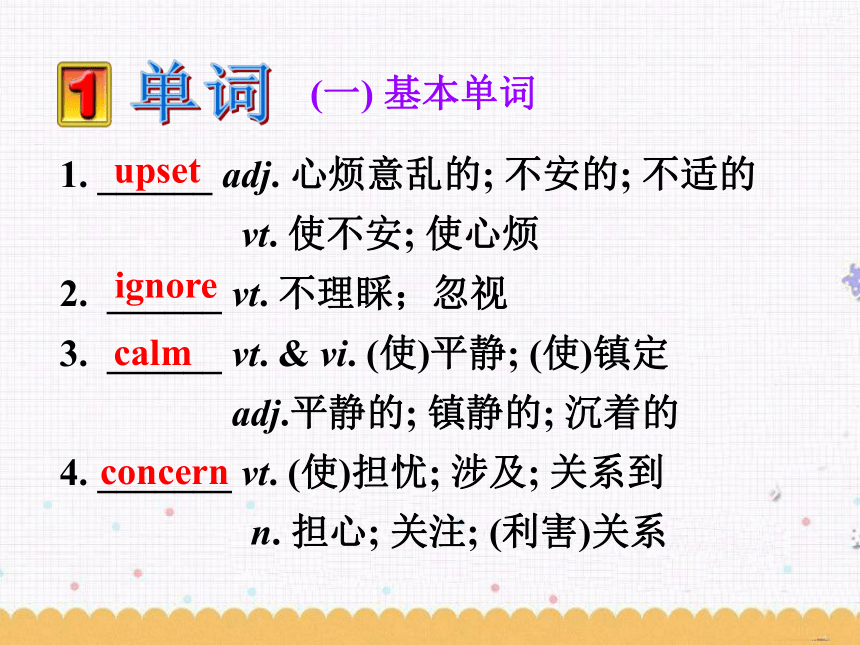
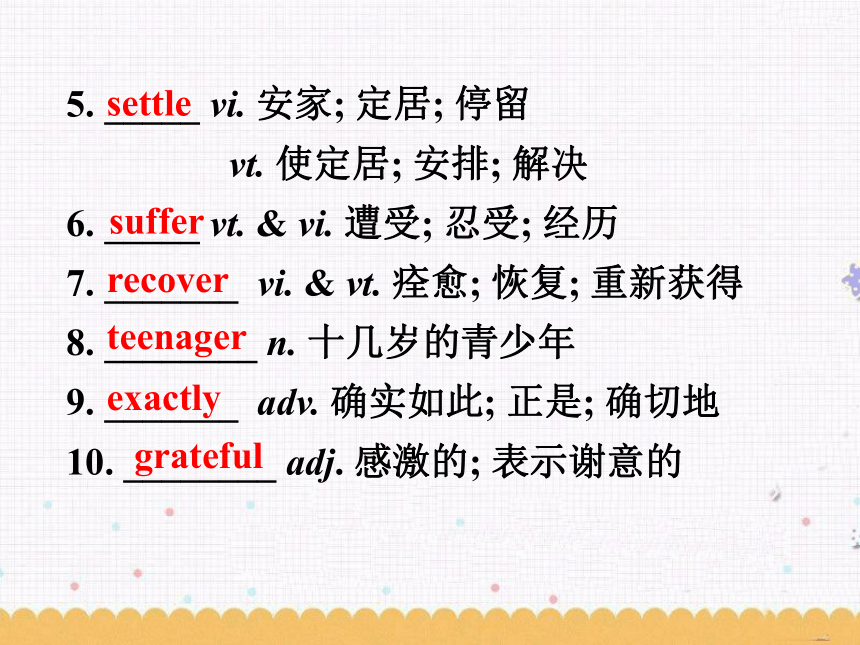
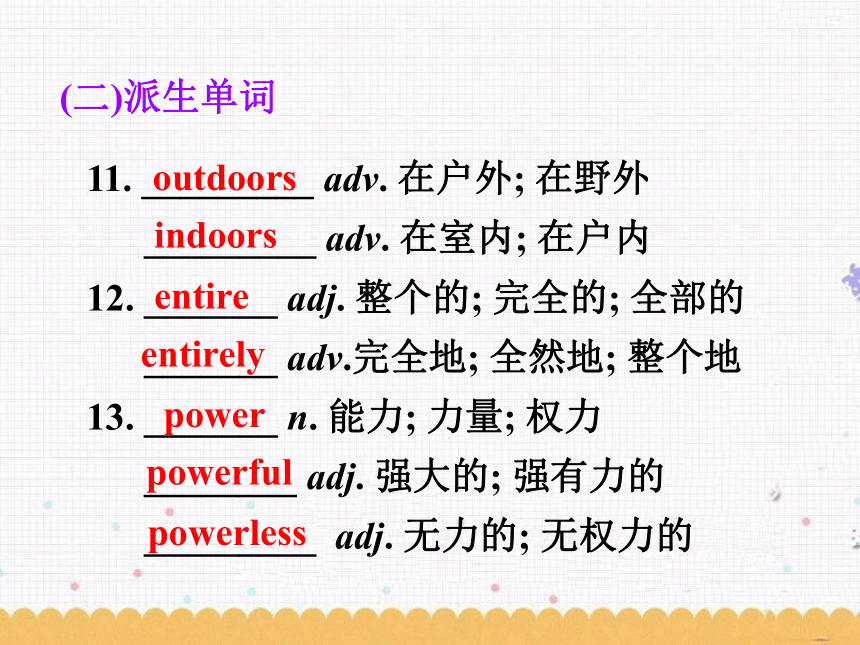
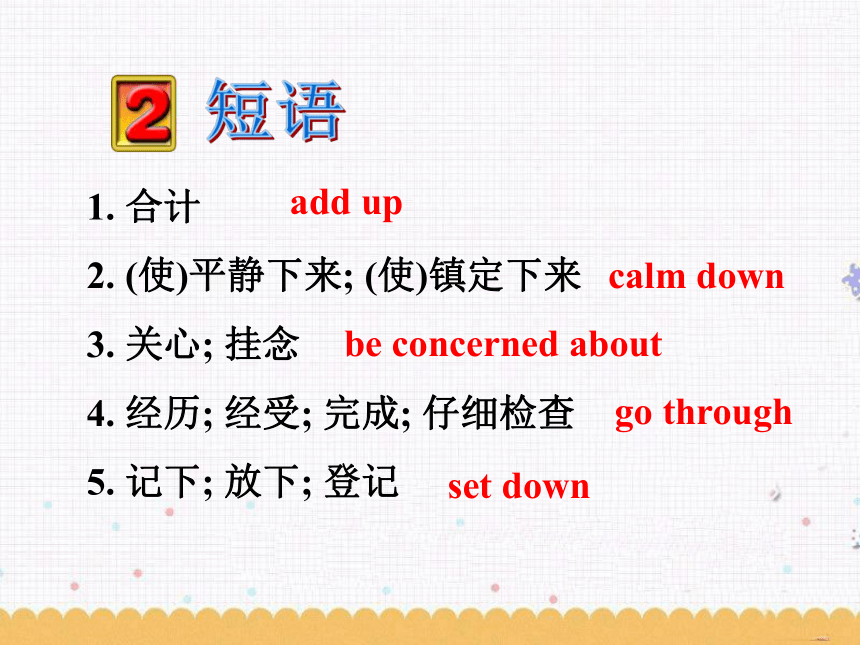
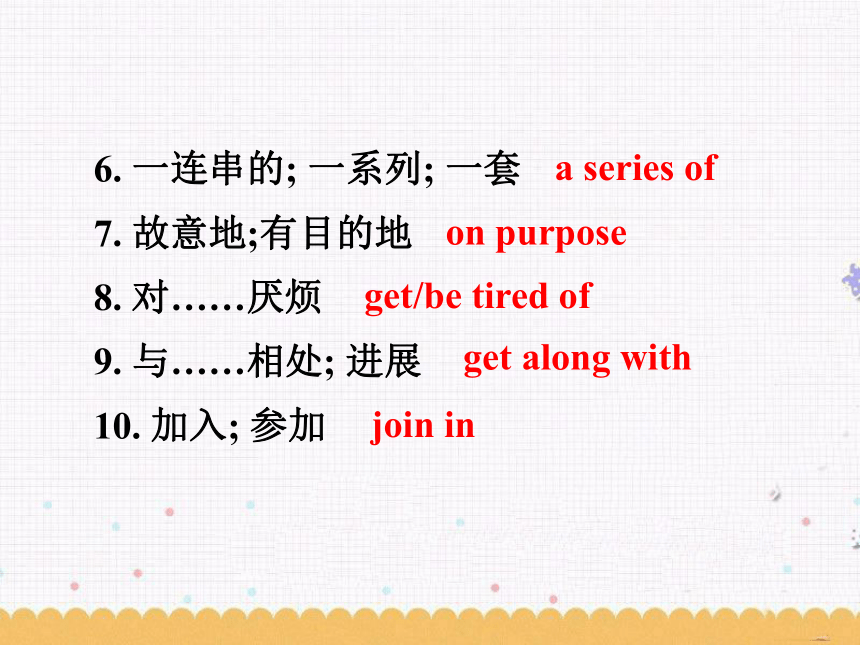

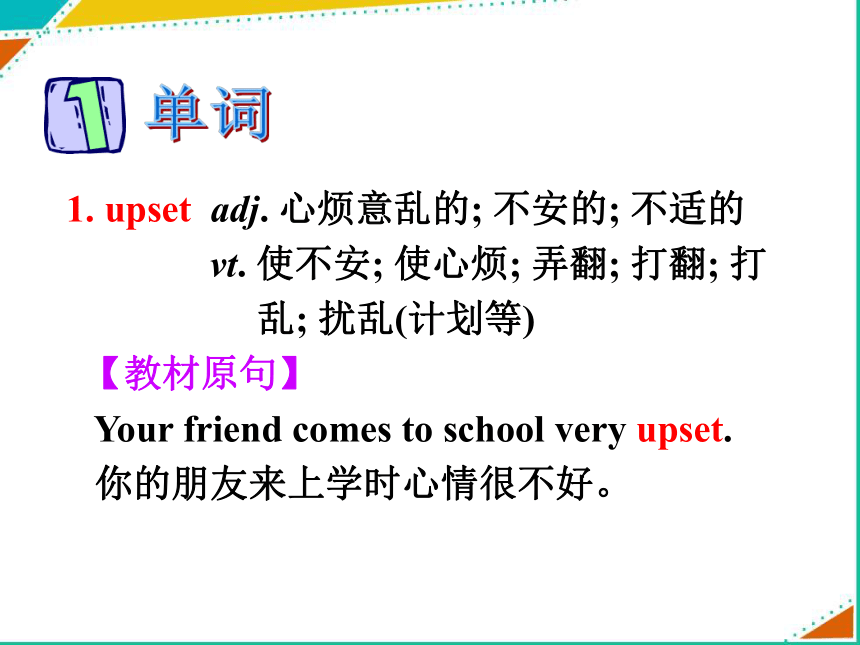
文档简介
课件67张PPT。Unit 1
Friendship知识清单1. ______ adj. 心烦意乱的; 不安的; 不适的
vt. 使不安; 使心烦
2. ______ vt. 不理睬;忽视
3. ______ vt. & vi. (使)平静; (使)镇定
adj.平静的; 镇静的; 沉着的
4. _______ vt. (使)担忧; 涉及; 关系到
n. 担心; 关注; (利害)关系upsetignorecalmconcern(一) 基本单词单词5. _____ vi. 安家; 定居; 停留
vt. 使定居; 安排; 解决
6. _____ vt. & vi. 遭受; 忍受; 经历
7. _______ vi. & vt. 痊愈; 恢复; 重新获得
8. ________ n. 十几岁的青少年
9. _______ adv. 确实如此; 正是; 确切地
10. ________ adj. 感激的; 表示谢意的settlerecoverteenagersuffergratefulexactly11. _________ adv. 在户外; 在野外
_________ adv. 在室内; 在户内
12. _______ adj. 整个的; 完全的; 全部的
_______ adv.完全地; 全然地; 整个地
13. _______ n. 能力; 力量; 权力
________ adj. 强大的; 强有力的
_________ adj. 无力的; 无权力的entirelyentireindoorspowerlessoutdoorspowerpowerful(二)派生单词1. 合计
2. (使)平静下来; (使)镇定下来
3. 关心; 挂念
4. 经历; 经受; 完成; 仔细检查
5. 记下; 放下; 登记add upcalm downbe concerned aboutgo throughset down短语6. 一连串的; 一系列; 一套
7. 故意地;有目的地
8. 对……厌烦
9. 与……相处; 进展
10. 加入; 参加 a series ofon purposeget/be tired ofget along withjoin in核心要点1. upset adj. 心烦意乱的; 不安的; 不适的
vt. 使不安; 使心烦; 弄翻; 打翻; 打
乱; 扰乱(计划等)
【教材原句】
Your friend comes to school very upset.
你的朋友来上学时心情很不好。 单词be upset about/over/at sth.
为某事烦心
(sth.) upset sb. (某事)使人心烦意乱
(sb.) upset sth. (某人) 打翻/弄翻某物
It upsets sb. that...
使人心烦的是…… (it作形式主语)
It upsets sb. to do sth.
做某事使某人心烦 (it作形式主语)【归纳】【提示】
upset为表语形容词, 不用作定语。
upset的过去式和过去分词形式仍为 upset。
upset的现在分词形式为upsetting。2. calm vt. &vi. (使)平静; (使)镇定
adj. 平静的; 镇定的; 沉着的
n. 平静; 宁静; 镇静
【教材原句】
You will ignore the bell and go somewhere
quiet to calm your friend down.
你可以不管铃声,去一个安静的地方,安慰你的朋友让他冷静下来。【归纳】
calm sb. down 使某人平静下来
calm down 平静/镇静下来
keep/ be calm 保持镇定calm 平静的, 沉着的。指无风浪的或人
的心情不激动的。
quiet 宁静的, 安静的。指不吵闹的或心
境不烦躁的。强调“没有一点声音”。calm / quiet / still / silentstill 静止的, 不动的。指(人体等)不运动的。
silent 沉默的, 缄口的, 寂静的。指不讲话或
没有声音。3. concern vt. (使)担忧; 涉及; 关系到
n. 担心; 关心; (利害)关系
【教材原句】
You will tell your friend that you are concerned about him/her…
你会告诉你的朋友你很关心他/她……【归纳】
concern oneself with 关心; 从事; 参与
concern oneself about 担心; 关心
be concerned about sth. 关心; 挂念be concerned with/in
与……有关; 参与; 牵涉到
show/express concern about/for...
对……表示关心/ 挂念
as/so far as....be concerned
就……而言 4. settle vi. 安家; 定居; 停留
vt. 使定居; 安排; 解决; 决定; 确定
【教材原句】
She found it difficult to settle and calm
down in the hiding place, …
她发现很难在这个栖身之处安定、平静下来……
【拓展】
settlement n. 协议; 解决; 殖民; 定居
settled adj. 固定的; 稳定的; 定居的【归纳】
settle down 安下心来; 定居
settle with 和......取得谅解
settle for 对......感到满足; 勉强认可
settle in 安顿; 适应
settle on 选定; 决定【拓展】
sufferer n.患病者; 受苦者; 受难者
suffering n. [U](身体、精神上的)痛苦; 苦恼
[C] (pl.) 苦难的经历;
让人痛苦的事5. suffer v. 遭受; 忍受; 经历
【教材原句】
She suffered from loneliness, but she had
to learn to like it there.
她遭受孤独, 但在那儿她不得不学着喜欢它。 6. recover v. 重新获得; 重新找回;
恢复; 痊愈
【教材原句】
How can Linda recover from her illness in
this room when it’s so dirty and dusty?
这个房间是如此的脏并且尘土飞扬, 在这里琳达怎么从病中康复呢?
【归纳】
recover from 从……中恢复
recover oneself 清醒过来
recover one’s losses 弥补损失【用法探究】
recover “寻回; 取回”, 指无意或有意地找到或得到曾经失掉的物质的或精神的东西,引申可指“恢复”、“重新控制”、“重新获得”、“回复到正常状态”等。
用作及物动词时, 如以人作主语, 则用主动结构; 如以物作主语, 则用被动结构。可接名词、代词作宾语。用作不及物动词时,常跟from连用, 表示从某种情况或状态中恢复过来。1. add up 合计; 加起来
【教材原句】
Add up your score and see how many
points you get.
将你的分数加起来, 看看你能得多少分。
【拓展】
add up to 总共是; 总计为; 结果是
add to 增加; 使(规模)扩大
add...to... 把……加到/进……里
add in 包括; 加进; 算进短语2. go through 经历; 浏览; 检查; 通过
【教材原句】
Or are you afraid that your friend
would laugh at you, or would not
understand and what you are going
through?
或者你是不是担心你的朋友会嘲笑你, 会不理解你目前的困境呢?
【拓展】
go ahead 干吧; 前进; 领先
go away 走开, 离去 go by 经过; 走过; 过去
go for 主张
go for a walk 散步
go in for 参加; 喜欢
go on 继续
go out 出去; 熄灭3. set down 记下; 放下; 登记
【教材原句】
I don’t want to set down a series of facts in a diary as most people do.
我不愿像大多数人那样在日记中记流水帐。
【拓展】
set free 释放, 解放
set off 动身, 起程; 使爆发
set out 出发; 开始
set up 建立; 树立; 创立4. get along/on with 与某人相处;
某事进展(如何)
【教材原句】
I’m getting along well with a boy in my class.
我和我们班里的一位男同学一直相处很好。
【拓展】
get away 逃脱; 离开
get back 回来; 返回; 回家
get close (to) 接近
get down 降下
get down to 开始认真(做某事)get in 进入; 收获; 达到
get off 脱下(衣服等); 下车
get on 上车; 过活
get through 通过; 拨通电话
get up 起床; 筹备; 起立; 打扮While walking the dog, you were careless and it got loose and was hit by a car.
在遛狗的时候,你不小心松了手,结果狗被一辆汽车撞了。
while walking ... 相当于while you were walking ..., 当时间或条件状语等从句中的主语同主句主语一致或主语是it, 且从句含有be动词时, 可以省略状语从句中的主语与系动词be。句式2. She and her family hid away for nearly
twenty-five months before they were
discovered.
她与家人躲藏了将近二十五个月之后才
被发现。
before conj. 用以表示从句动作发生之前的时间,译法灵活。1) 强调从句动作发生在主句之前,“不等……就……”。如:
Before I could say a word, he had left.
我还没来得及说话, 他就已经离开了。
2) It+be+时间段+before从句,“……之后才……”。如:
It I realized the truth.
过了很长一段时间我才悟出真相。was some time before3) It+be+not+long+before从句,“……不久就……”。如:
John thinks it won’t be long before he is ready for his new job.
约翰认为不久之后他就会为他的新工作做好准备。
4) “趁着……”或“过了……才……”。如:
I must write it down before I forget it.
趁着我还没忘,我得把它记下来。语法直接引语是直接引述别人的原话,在书面语中经常将其放在引号中。间接引语是用自己的话转述别人的话,无需加引号,在多数情况下间接引语构成宾语从句。 直接引语与间接引语(一)【语境展示】 观察下列几组句子。
1. A. My son said, “I want to go to the bookstore.”
→ My son said that he wanted to go to the bookstore.
B. I said to Jack, “You didn’t tell me what happened yesterday.”
→ I told Jack that he hadn’t told me what had happened the day before.2. A. “Are you ready?” the teacher asked Tom.
→ The teacher asked Tom if / whether he was ready.
B. He asked John, “Were you playing football at this time yesterday?”
→ He asked John if / whether he was playing football at that time the day before3. A. My mother asked me, “Do you like the red or the yellow?”
→ My mother asked me whether I liked the red or the yellow.
B. I asked him, “Will you stay at home or go for a walk tonight?”
→ I asked him whether he would stay at home or go for a walk that night.4. A. “How do you go to work, Mary?” she asked.
→ She asked Mary how she went to work.
B. Kate asked, “What is your favorite book, Tom?”
→ Kate asked Tom what his favorite book was.【自我归纳】
★直接引语是陈述句,变间接引语时,在多数情况下都构成一个由 ______引导的宾语从句,引述动词通常是_____, _____等。如第1组。
★直接引语是一般疑问句,变为间接引语时,常将它变成由连词_____或________引导的宾语从句,其主句动词常用ask。如第2组。
★直接引语为______疑问句,变为间接引语时,常将它变成由____________引导的宾语从句。如第3组。tellthatsaywhetherif选择whether... or★直接引语为______疑问句,变为间接引语时,将它变成由疑问词引导的宾语从句。如第4组。
★直接引语变为间接引语时,时态、人称、指示代词、时间状语、地点状语等要作相应的变化。此外,疑问句由直接引语变为间接引语时,原来的疑问语序要变为______语序。陈述特殊【即学即练】 将直接引语变为间接引语。
1. “What did you do yesterday, Jenny?” said the mother.
→___________________________________
___________________________________
2. Joan said to Lucy, “I will leave for Beijing tomorrow morning.”
→___________________________________
___________________________________The mother asked Jenny what she had
done the day before.Joan told Lucy that she would leave for?
Beijing?the next morning.3. My mother asked me, “Do you really want to buy that coat?”
→___________________________________
___________________________________
4. Mary asked me, “Do you like coffee or tea?”
→___________________________________
___________________________________My mother asked me if? / whether I
really wanted to buy that coat.Mary asked me whether I liked coffee
or tea.建议信是书信的一种形式,属于应用文。建议信是写信人向收信人就某事提出自己的建议或忠告,有可能是写给个人,就收信人遇到的某个问题提出自己的看法和观点;也可能是写给某个组织或机构,就改进其服务等方面提出建议或忠告。写作如何写建议信【写作指导】
首段:一般指明提建议的初衷。
中段:围绕问题,婉转地提出有针对性且具有说服性的建议。注意充分考虑对方的实际情况,表达时用语要得体。
尾段:简单予以希望。希望建议能对对方有所帮助,同时阐明建议仅供对方参考。
注意:
★ 时态应以一般现在时为主。
★ 由于是给别人提出建议,所以人称应该以第
二人称为主。【常用表达】
建议信开头:
You have asked me for my advice on ... and I will try to make some suggestions.
Thanks for trusting me. It’s my great pleasure to give you some suggestions / advice / tips on ...I’m sorry to hear / learn that ...? However, the situation is easy to change if you take my advice.
I’m sorry (that) you are having trouble / difficulty / problems in ... I think you can make it if you follow the advice below.
I’d like to offer you some advice.表达建议:
I would like to suggest that ...
If I were you, I would ...
As far as I am concerned ... / In my opinion ...
It seems better that ...
Why not ...?????? It would be a good idea if ...
For one thing ..., for another ...
In the first place / Firstly / First ... Secondly / Second ... Last but not least (最后但也是重要的) ...建议信结尾:
These are only my personal suggestions / tips. I hope you will find them useful / helpful.
I would be ready to discuss this matter with you in further detail.
I’m willing to discuss this matter with you whenever ...
I will highly appreciate your consideration of my advice / suggestions / tips.
I hope ...【写作任务】
?????? 假设你是李华,最近你的英国笔友杰克刚刚转入一所新学校。由于他性格内向,不擅长交朋友,所以他感到非常孤独,写信向你求助。请你给他回一封电子邮件。
注意:
1. 词数100左右(开头语已为你写好,但不
计入总词数);
2. 可以适当增加细节,以使行文连贯。 【参考范文】
Dear Jack,
?????? I’m sorry to hear that you are lonely in a new school because you find it hard to make friends because of your shyness. Now I’d like to offer you some advice.
?????? First of all, it is normal for you to feel lonely because you are living now in a new environment. Second, you should greet your teachers and classmates when meeting them on campus. Third, it will be a good idea if you often express your ideas in class and take an active part in class activities, which can help them learn more about you. I believe you are sure to make new friends soon if you show your friendliness to others.
?????? I hope everything will be fine with you in the future. 高考链接1. (2014·浙江改编)Last week a tennis ball
hit me on the head, but I tried ________
(ignore) the pain, believing that it would
go away sooner or later.
答案: to ignore
try后接不定式表示“尽力……”。
句意: 上周一个网球打中了我的头, 但是我尽力无视疼痛, 相信它迟早会消失的。2. (2012·四川改编)New technologies have made
______ possible to turn out new products
faster and at a lower cost.
答案:it
本题考查代词。
句意:新的技术使得更快更便宜地生产新产品成为可能。make后跟复合结构, 宾语是后
面的不定式to turn out new products faster
and at a lower cost, 宾补是possible, 此处是形式宾语, 要用it。3. (2012·四川改编)Before driving into the
city, you are required to get your car
______ (wash).
答案:washed
本题考查非谓语动词。get后跟复合宾语,
宾语是car, 与宾补wash之间是被动关系,
故用过去分词形式。
句意:在开车进城市之前,按要求你要把
你的车洗干净。4. (2012·安徽改编)When ______ (ask) for his
views about his teaching job, Philip said he
found it very interesting and rewarding.
答案:asked
本题考查状语从句的省略。
句意:当被问到他对他的教学工作的看法时,
菲利普说他觉得这份工作很有趣, 很值得。
此处用过去分词表被动, 是省略的时间状语
从句, 补充完整为: When Philip was asked
for his views about his teaching job,...。5. (2014·安徽改编)The meaning of the word
“nice” changed a few times ______ it finally
came to include the sense “pleasant”.
答案:before
本题考查时间连词。根据finally可知, came
to include the sense “pleasant” 于The
meaning of the word “nice” changed a few
times后发生, 故填before。
句意: “nice”一词的含义变化了数次, 直到最
后它才包括了pleasant的含义。即:在nice包
括pleasant这一含义之前,其含义还有其他
几次演变。巩固练习I. 用括号内所给单词的正确形式填空。
1. Nancy called the doctor because she was _________ (concern) about Grandma’s illness.
2. I believe that encouragement is so ________ (power) that it can change a person.
3. Kate found a(n) _______ (dust) bag under the bed when she was cleaning up the room this morning.concernedpowerfuldusty4. The hostess of the party was told that the guests were _______ (entire) satisfied with the meal.
5. I would be most _______ (grate) if you would send me the book immediately.
6. Frank simply _______ (like) working with committees and avoided it whenever possible. entirelygratefuldislikedII. 用方框内合适短语并用其正确形式填空。
1. We will go back to normal when things __________.
2. You will never know what the woman ____________ to educate her deaf son.calm downwent throughadd up join in set down
calm down go through3. Henry was good at ___________ his thoughts on paper.
4. The songs the woman sang were known by everyone present and all ________ as she sang.
5. His business expenses __________ to around $4,000 a year.setting downjoined inadd(ed) upadd up join in set down
calm down go throughIII. 将下列直接引语变为间接引语。
1. My daughter said, “I want to buy the skirt in this shop.”
_____________________________________
_____________________________________
2. “The students are taking a listening test now,” the teacher said to me.
_____________________________________
_____________________________________The teacher told me (that) the students were
taking a listening test then.My daughter said (that) she wanted to buy
the skirt in that shop.3. I asked him, “Will you stay at home or go to the cinema tonight?”
_____________________________________
_____________________________________
4. “When will the manager come back from Paris?” she asked me.
_____________________________________
_____________________________________She asked me when the manager would
come back from?Paris.I asked him if? / whether he would stay at
home or go to the cinema that night.Ⅳ. 阅读材料,在空白处填入适当内容。
A famous Hollywood actress said that it was only the friends you can call up at four o’clock in the morning 1. _____ matter. Clearly, she believed friends should never ignore or get tired of 2. ________ (hear) from you even if they have drawn the curtains and settled down for the night. But surely there is more to friendship 3. _____ just being there for you whenever you may need them. The ancient Greek historian, Plutarch, said that he didn’t need a friend 4. ________ changed when he changed and nodded when he nodded. thathearingthanwho/that“My shadow does that much 5. ______ (well),” said Plutarch. He didn’t just want a friend to get along 6. _____ him: he wanted a friend who was prepared to 7. ________ (agree) with him, too. “Do I not destroy my enemies when I make 8. ______ my friends?” asked Abraham Lincoln, who was President of the United States during its civil war. It seems that Lincoln believed 9. ____ friend could even be made on purpose in order to make the world a better place. So 10. _____ does friendship mean to you?what betterwithdisagree thema
Friendship知识清单1. ______ adj. 心烦意乱的; 不安的; 不适的
vt. 使不安; 使心烦
2. ______ vt. 不理睬;忽视
3. ______ vt. & vi. (使)平静; (使)镇定
adj.平静的; 镇静的; 沉着的
4. _______ vt. (使)担忧; 涉及; 关系到
n. 担心; 关注; (利害)关系upsetignorecalmconcern(一) 基本单词单词5. _____ vi. 安家; 定居; 停留
vt. 使定居; 安排; 解决
6. _____ vt. & vi. 遭受; 忍受; 经历
7. _______ vi. & vt. 痊愈; 恢复; 重新获得
8. ________ n. 十几岁的青少年
9. _______ adv. 确实如此; 正是; 确切地
10. ________ adj. 感激的; 表示谢意的settlerecoverteenagersuffergratefulexactly11. _________ adv. 在户外; 在野外
_________ adv. 在室内; 在户内
12. _______ adj. 整个的; 完全的; 全部的
_______ adv.完全地; 全然地; 整个地
13. _______ n. 能力; 力量; 权力
________ adj. 强大的; 强有力的
_________ adj. 无力的; 无权力的entirelyentireindoorspowerlessoutdoorspowerpowerful(二)派生单词1. 合计
2. (使)平静下来; (使)镇定下来
3. 关心; 挂念
4. 经历; 经受; 完成; 仔细检查
5. 记下; 放下; 登记add upcalm downbe concerned aboutgo throughset down短语6. 一连串的; 一系列; 一套
7. 故意地;有目的地
8. 对……厌烦
9. 与……相处; 进展
10. 加入; 参加 a series ofon purposeget/be tired ofget along withjoin in核心要点1. upset adj. 心烦意乱的; 不安的; 不适的
vt. 使不安; 使心烦; 弄翻; 打翻; 打
乱; 扰乱(计划等)
【教材原句】
Your friend comes to school very upset.
你的朋友来上学时心情很不好。 单词be upset about/over/at sth.
为某事烦心
(sth.) upset sb. (某事)使人心烦意乱
(sb.) upset sth. (某人) 打翻/弄翻某物
It upsets sb. that...
使人心烦的是…… (it作形式主语)
It upsets sb. to do sth.
做某事使某人心烦 (it作形式主语)【归纳】【提示】
upset为表语形容词, 不用作定语。
upset的过去式和过去分词形式仍为 upset。
upset的现在分词形式为upsetting。2. calm vt. &vi. (使)平静; (使)镇定
adj. 平静的; 镇定的; 沉着的
n. 平静; 宁静; 镇静
【教材原句】
You will ignore the bell and go somewhere
quiet to calm your friend down.
你可以不管铃声,去一个安静的地方,安慰你的朋友让他冷静下来。【归纳】
calm sb. down 使某人平静下来
calm down 平静/镇静下来
keep/ be calm 保持镇定calm 平静的, 沉着的。指无风浪的或人
的心情不激动的。
quiet 宁静的, 安静的。指不吵闹的或心
境不烦躁的。强调“没有一点声音”。calm / quiet / still / silentstill 静止的, 不动的。指(人体等)不运动的。
silent 沉默的, 缄口的, 寂静的。指不讲话或
没有声音。3. concern vt. (使)担忧; 涉及; 关系到
n. 担心; 关心; (利害)关系
【教材原句】
You will tell your friend that you are concerned about him/her…
你会告诉你的朋友你很关心他/她……【归纳】
concern oneself with 关心; 从事; 参与
concern oneself about 担心; 关心
be concerned about sth. 关心; 挂念be concerned with/in
与……有关; 参与; 牵涉到
show/express concern about/for...
对……表示关心/ 挂念
as/so far as....be concerned
就……而言 4. settle vi. 安家; 定居; 停留
vt. 使定居; 安排; 解决; 决定; 确定
【教材原句】
She found it difficult to settle and calm
down in the hiding place, …
她发现很难在这个栖身之处安定、平静下来……
【拓展】
settlement n. 协议; 解决; 殖民; 定居
settled adj. 固定的; 稳定的; 定居的【归纳】
settle down 安下心来; 定居
settle with 和......取得谅解
settle for 对......感到满足; 勉强认可
settle in 安顿; 适应
settle on 选定; 决定【拓展】
sufferer n.患病者; 受苦者; 受难者
suffering n. [U](身体、精神上的)痛苦; 苦恼
[C] (pl.) 苦难的经历;
让人痛苦的事5. suffer v. 遭受; 忍受; 经历
【教材原句】
She suffered from loneliness, but she had
to learn to like it there.
她遭受孤独, 但在那儿她不得不学着喜欢它。 6. recover v. 重新获得; 重新找回;
恢复; 痊愈
【教材原句】
How can Linda recover from her illness in
this room when it’s so dirty and dusty?
这个房间是如此的脏并且尘土飞扬, 在这里琳达怎么从病中康复呢?
【归纳】
recover from 从……中恢复
recover oneself 清醒过来
recover one’s losses 弥补损失【用法探究】
recover “寻回; 取回”, 指无意或有意地找到或得到曾经失掉的物质的或精神的东西,引申可指“恢复”、“重新控制”、“重新获得”、“回复到正常状态”等。
用作及物动词时, 如以人作主语, 则用主动结构; 如以物作主语, 则用被动结构。可接名词、代词作宾语。用作不及物动词时,常跟from连用, 表示从某种情况或状态中恢复过来。1. add up 合计; 加起来
【教材原句】
Add up your score and see how many
points you get.
将你的分数加起来, 看看你能得多少分。
【拓展】
add up to 总共是; 总计为; 结果是
add to 增加; 使(规模)扩大
add...to... 把……加到/进……里
add in 包括; 加进; 算进短语2. go through 经历; 浏览; 检查; 通过
【教材原句】
Or are you afraid that your friend
would laugh at you, or would not
understand and what you are going
through?
或者你是不是担心你的朋友会嘲笑你, 会不理解你目前的困境呢?
【拓展】
go ahead 干吧; 前进; 领先
go away 走开, 离去 go by 经过; 走过; 过去
go for 主张
go for a walk 散步
go in for 参加; 喜欢
go on 继续
go out 出去; 熄灭3. set down 记下; 放下; 登记
【教材原句】
I don’t want to set down a series of facts in a diary as most people do.
我不愿像大多数人那样在日记中记流水帐。
【拓展】
set free 释放, 解放
set off 动身, 起程; 使爆发
set out 出发; 开始
set up 建立; 树立; 创立4. get along/on with 与某人相处;
某事进展(如何)
【教材原句】
I’m getting along well with a boy in my class.
我和我们班里的一位男同学一直相处很好。
【拓展】
get away 逃脱; 离开
get back 回来; 返回; 回家
get close (to) 接近
get down 降下
get down to 开始认真(做某事)get in 进入; 收获; 达到
get off 脱下(衣服等); 下车
get on 上车; 过活
get through 通过; 拨通电话
get up 起床; 筹备; 起立; 打扮While walking the dog, you were careless and it got loose and was hit by a car.
在遛狗的时候,你不小心松了手,结果狗被一辆汽车撞了。
while walking ... 相当于while you were walking ..., 当时间或条件状语等从句中的主语同主句主语一致或主语是it, 且从句含有be动词时, 可以省略状语从句中的主语与系动词be。句式2. She and her family hid away for nearly
twenty-five months before they were
discovered.
她与家人躲藏了将近二十五个月之后才
被发现。
before conj. 用以表示从句动作发生之前的时间,译法灵活。1) 强调从句动作发生在主句之前,“不等……就……”。如:
Before I could say a word, he had left.
我还没来得及说话, 他就已经离开了。
2) It+be+时间段+before从句,“……之后才……”。如:
It I realized the truth.
过了很长一段时间我才悟出真相。was some time before3) It+be+not+long+before从句,“……不久就……”。如:
John thinks it won’t be long before he is ready for his new job.
约翰认为不久之后他就会为他的新工作做好准备。
4) “趁着……”或“过了……才……”。如:
I must write it down before I forget it.
趁着我还没忘,我得把它记下来。语法直接引语是直接引述别人的原话,在书面语中经常将其放在引号中。间接引语是用自己的话转述别人的话,无需加引号,在多数情况下间接引语构成宾语从句。 直接引语与间接引语(一)【语境展示】 观察下列几组句子。
1. A. My son said, “I want to go to the bookstore.”
→ My son said that he wanted to go to the bookstore.
B. I said to Jack, “You didn’t tell me what happened yesterday.”
→ I told Jack that he hadn’t told me what had happened the day before.2. A. “Are you ready?” the teacher asked Tom.
→ The teacher asked Tom if / whether he was ready.
B. He asked John, “Were you playing football at this time yesterday?”
→ He asked John if / whether he was playing football at that time the day before3. A. My mother asked me, “Do you like the red or the yellow?”
→ My mother asked me whether I liked the red or the yellow.
B. I asked him, “Will you stay at home or go for a walk tonight?”
→ I asked him whether he would stay at home or go for a walk that night.4. A. “How do you go to work, Mary?” she asked.
→ She asked Mary how she went to work.
B. Kate asked, “What is your favorite book, Tom?”
→ Kate asked Tom what his favorite book was.【自我归纳】
★直接引语是陈述句,变间接引语时,在多数情况下都构成一个由 ______引导的宾语从句,引述动词通常是_____, _____等。如第1组。
★直接引语是一般疑问句,变为间接引语时,常将它变成由连词_____或________引导的宾语从句,其主句动词常用ask。如第2组。
★直接引语为______疑问句,变为间接引语时,常将它变成由____________引导的宾语从句。如第3组。tellthatsaywhetherif选择whether... or★直接引语为______疑问句,变为间接引语时,将它变成由疑问词引导的宾语从句。如第4组。
★直接引语变为间接引语时,时态、人称、指示代词、时间状语、地点状语等要作相应的变化。此外,疑问句由直接引语变为间接引语时,原来的疑问语序要变为______语序。陈述特殊【即学即练】 将直接引语变为间接引语。
1. “What did you do yesterday, Jenny?” said the mother.
→___________________________________
___________________________________
2. Joan said to Lucy, “I will leave for Beijing tomorrow morning.”
→___________________________________
___________________________________The mother asked Jenny what she had
done the day before.Joan told Lucy that she would leave for?
Beijing?the next morning.3. My mother asked me, “Do you really want to buy that coat?”
→___________________________________
___________________________________
4. Mary asked me, “Do you like coffee or tea?”
→___________________________________
___________________________________My mother asked me if? / whether I
really wanted to buy that coat.Mary asked me whether I liked coffee
or tea.建议信是书信的一种形式,属于应用文。建议信是写信人向收信人就某事提出自己的建议或忠告,有可能是写给个人,就收信人遇到的某个问题提出自己的看法和观点;也可能是写给某个组织或机构,就改进其服务等方面提出建议或忠告。写作如何写建议信【写作指导】
首段:一般指明提建议的初衷。
中段:围绕问题,婉转地提出有针对性且具有说服性的建议。注意充分考虑对方的实际情况,表达时用语要得体。
尾段:简单予以希望。希望建议能对对方有所帮助,同时阐明建议仅供对方参考。
注意:
★ 时态应以一般现在时为主。
★ 由于是给别人提出建议,所以人称应该以第
二人称为主。【常用表达】
建议信开头:
You have asked me for my advice on ... and I will try to make some suggestions.
Thanks for trusting me. It’s my great pleasure to give you some suggestions / advice / tips on ...I’m sorry to hear / learn that ...? However, the situation is easy to change if you take my advice.
I’m sorry (that) you are having trouble / difficulty / problems in ... I think you can make it if you follow the advice below.
I’d like to offer you some advice.表达建议:
I would like to suggest that ...
If I were you, I would ...
As far as I am concerned ... / In my opinion ...
It seems better that ...
Why not ...?????? It would be a good idea if ...
For one thing ..., for another ...
In the first place / Firstly / First ... Secondly / Second ... Last but not least (最后但也是重要的) ...建议信结尾:
These are only my personal suggestions / tips. I hope you will find them useful / helpful.
I would be ready to discuss this matter with you in further detail.
I’m willing to discuss this matter with you whenever ...
I will highly appreciate your consideration of my advice / suggestions / tips.
I hope ...【写作任务】
?????? 假设你是李华,最近你的英国笔友杰克刚刚转入一所新学校。由于他性格内向,不擅长交朋友,所以他感到非常孤独,写信向你求助。请你给他回一封电子邮件。
注意:
1. 词数100左右(开头语已为你写好,但不
计入总词数);
2. 可以适当增加细节,以使行文连贯。 【参考范文】
Dear Jack,
?????? I’m sorry to hear that you are lonely in a new school because you find it hard to make friends because of your shyness. Now I’d like to offer you some advice.
?????? First of all, it is normal for you to feel lonely because you are living now in a new environment. Second, you should greet your teachers and classmates when meeting them on campus. Third, it will be a good idea if you often express your ideas in class and take an active part in class activities, which can help them learn more about you. I believe you are sure to make new friends soon if you show your friendliness to others.
?????? I hope everything will be fine with you in the future. 高考链接1. (2014·浙江改编)Last week a tennis ball
hit me on the head, but I tried ________
(ignore) the pain, believing that it would
go away sooner or later.
答案: to ignore
try后接不定式表示“尽力……”。
句意: 上周一个网球打中了我的头, 但是我尽力无视疼痛, 相信它迟早会消失的。2. (2012·四川改编)New technologies have made
______ possible to turn out new products
faster and at a lower cost.
答案:it
本题考查代词。
句意:新的技术使得更快更便宜地生产新产品成为可能。make后跟复合结构, 宾语是后
面的不定式to turn out new products faster
and at a lower cost, 宾补是possible, 此处是形式宾语, 要用it。3. (2012·四川改编)Before driving into the
city, you are required to get your car
______ (wash).
答案:washed
本题考查非谓语动词。get后跟复合宾语,
宾语是car, 与宾补wash之间是被动关系,
故用过去分词形式。
句意:在开车进城市之前,按要求你要把
你的车洗干净。4. (2012·安徽改编)When ______ (ask) for his
views about his teaching job, Philip said he
found it very interesting and rewarding.
答案:asked
本题考查状语从句的省略。
句意:当被问到他对他的教学工作的看法时,
菲利普说他觉得这份工作很有趣, 很值得。
此处用过去分词表被动, 是省略的时间状语
从句, 补充完整为: When Philip was asked
for his views about his teaching job,...。5. (2014·安徽改编)The meaning of the word
“nice” changed a few times ______ it finally
came to include the sense “pleasant”.
答案:before
本题考查时间连词。根据finally可知, came
to include the sense “pleasant” 于The
meaning of the word “nice” changed a few
times后发生, 故填before。
句意: “nice”一词的含义变化了数次, 直到最
后它才包括了pleasant的含义。即:在nice包
括pleasant这一含义之前,其含义还有其他
几次演变。巩固练习I. 用括号内所给单词的正确形式填空。
1. Nancy called the doctor because she was _________ (concern) about Grandma’s illness.
2. I believe that encouragement is so ________ (power) that it can change a person.
3. Kate found a(n) _______ (dust) bag under the bed when she was cleaning up the room this morning.concernedpowerfuldusty4. The hostess of the party was told that the guests were _______ (entire) satisfied with the meal.
5. I would be most _______ (grate) if you would send me the book immediately.
6. Frank simply _______ (like) working with committees and avoided it whenever possible. entirelygratefuldislikedII. 用方框内合适短语并用其正确形式填空。
1. We will go back to normal when things __________.
2. You will never know what the woman ____________ to educate her deaf son.calm downwent throughadd up join in set down
calm down go through3. Henry was good at ___________ his thoughts on paper.
4. The songs the woman sang were known by everyone present and all ________ as she sang.
5. His business expenses __________ to around $4,000 a year.setting downjoined inadd(ed) upadd up join in set down
calm down go throughIII. 将下列直接引语变为间接引语。
1. My daughter said, “I want to buy the skirt in this shop.”
_____________________________________
_____________________________________
2. “The students are taking a listening test now,” the teacher said to me.
_____________________________________
_____________________________________The teacher told me (that) the students were
taking a listening test then.My daughter said (that) she wanted to buy
the skirt in that shop.3. I asked him, “Will you stay at home or go to the cinema tonight?”
_____________________________________
_____________________________________
4. “When will the manager come back from Paris?” she asked me.
_____________________________________
_____________________________________She asked me when the manager would
come back from?Paris.I asked him if? / whether he would stay at
home or go to the cinema that night.Ⅳ. 阅读材料,在空白处填入适当内容。
A famous Hollywood actress said that it was only the friends you can call up at four o’clock in the morning 1. _____ matter. Clearly, she believed friends should never ignore or get tired of 2. ________ (hear) from you even if they have drawn the curtains and settled down for the night. But surely there is more to friendship 3. _____ just being there for you whenever you may need them. The ancient Greek historian, Plutarch, said that he didn’t need a friend 4. ________ changed when he changed and nodded when he nodded. thathearingthanwho/that“My shadow does that much 5. ______ (well),” said Plutarch. He didn’t just want a friend to get along 6. _____ him: he wanted a friend who was prepared to 7. ________ (agree) with him, too. “Do I not destroy my enemies when I make 8. ______ my friends?” asked Abraham Lincoln, who was President of the United States during its civil war. It seems that Lincoln believed 9. ____ friend could even be made on purpose in order to make the world a better place. So 10. _____ does friendship mean to you?what betterwithdisagree thema
